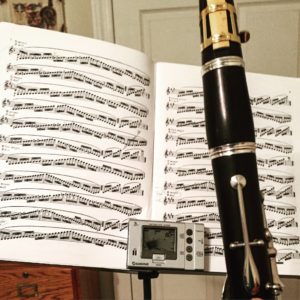Your One-Week Guide to Sounding Like You Practiced All Summer (Even When You Haven’t)
I get it. School’s out, and you just need a short break after all the stress of juries, finals, recitals, exams, etc etc. Practice breaks are healthy, right?
Then one week turns into two…which turns into a month…which brings us here today. You haven’t touched your instrument all summer (or at least in recent memory), and the impending start of school is causing a constant low-grade anxiety in the back of your mind.
I’m not here to lecture or judge. We’ve all taken extended practice breaks, and unless you have the willpower of Beethoven, it’s easy fall off the practice bandwagon. Learn from your mistakes, move on, dust off your instrument, and get ready for your back-to-school practice boot camp.
I’ve created a 7-day back-to-school practice boot camp so you can sound like you’ve been practicing all summer (even when you haven’t). The goal of this practice regimen is not to go from 0 – Paganini. This is a practice routine intended to ease your transition back into school by retraining your embouchure and technique. By the end of this week, you’ll be practicing for two hours a day. Feel free to split up the practice sessions to avoid fatigue. For example, if you cannot practice for 60 minutes all at once, do two sessions of 30 minutes each. ALWAYS take regular breaks. I like to take a 15 minute break after I have practiced 45 minutes, which I have included in the routine below.
Here’s a breakdown of the different elements in this boot camp:
- Long tones – After an extended practice break, your embouchure will probably take the biggest hit. It will be out of shape and will fatigue more easily. Long tones are the best way to retrain your embouchure and redevelop your air (for wind instrumentalists). Start with long tones in a comfortable range – not too low or high. Strive to create your best sound, focusing on using proper air.
- Slow scales – Use a metronome to practice your scales very slowly (40-60 BPM). The slower the better! You can use a scale book or play from memory. At first, your fingers will probably feel unwieldy and awkward, so we are retraining them to work fluidly together. Practicing scales is like weight-lifting – you would never begin by lifting 100-lb weights; you gradually increase the weight to reach your goal. To improve technique and avoid injuries, start slowly and work your way up to faster tempos.
- Medium scales – Once your fingers are cooperating at slower tempi, move the metronome to a comfortable medium tempo (60-80 BPM).
- Fast scales – 80-120 BPM
- Technical studies – There are countless technical studies written for each instrument. Find your favorite and begin slowly at first, working your way to faster tempi as you did in scales. My favorite books for clarinetists are the Jeanjean Vade-Mecum and Kroepsch 416 Progressive Studies.
- Études – Ease the transition from warm-up to assigned repertoire by playing through some études. Études are musically challenging but also short enough that you will not overexert yourself.
- Assigned repertoire – After your embouchure and technique have regained some momentum, begin practicing your assigned repertoire very slowly. This can be overwhelming, especially if you are learning an entire concerto or sonata, so set daily goals and practice in smaller sections.
Day 1 – 30 minutes
- 15 minutes long tones
- 15 minutes slow scales (40-60 BPM)
Day 2 – 45 minutes
- 15 minutes long tones
- 15 minutes slow scales (40-60 BPM)
- 15 minutes technical studies
Day 3 – 1 hour
- 15 minutes long tones
- 15 minutes medium scales (60-80 BPM)
- 15 minutes technical studies
- 15 minute break
- 15 minutes études
Day 4 – 1 hour 15 minutes
- 15 minutes long tones
- 15 minutes medium scales (60-80 BPM)
- 15 minutes technical studies
- 15 minute break
- 15 minutes études
- 15 minutes assigned repertoire
Day 5 – 1 hour 30 minutes
- 15 minutes long tones
- 15 minutes medium scales (60-80 BPM)
- 15 minutes technical studies
- 15 minute break
- 15 minutes études
- 30 minutes assigned repertoire
Day 6 – 1 hour 45 minutes
- 15 minutes long tones
- 15 minutes medium scales (60-80 BPM)
- 15 minutes fast scales (80-120 BPM)
- 15 minute break
- 15 minutes technical studies
- 15 minutes études
- 30 minutes assigned repertoire
Day 7 – 2 hours
- 15 minutes of long tones
- 15 minutes of fast scales (80-120 BPM)
- 15 minutes of technical studies
- 15 minute break
- 45 minutes assigned repertoire
- 15 minute break
- 30 minutes free choice – Practice whatever you feel needs some extra attention. When in doubt, scales and technical studies are always a good idea!
Congratulations, you’ve reached the end of the 7-day practice boot camp! Hopefully you’re feeling more prepared and less anxious about school starting. Use this guide as a reference to establish a regular practice routine that you can maintain throughout the school year.
Here’s a printable version of my 7-day back-to-school boot camp for easy reference.
As always, good luck and happy practicing!

6 Comments
Courtney
What if I only have 4-5 days to catch up before I have to go back? Where do I start? Step 1, 2, or 3?
jennymaclay
I would start on step 1 and work your way up to day 4 (or 5, depending on how many days you have). Hope this helps!
Anonymous
Thank you so much! This will help me a lot!
Diego
What do I do if I haven’t practiced all summer and band camp is tommorow?
jennymaclay
Take a deep breath, start with some long tones, find a good reed, and vow not to make the same mistake next year! Good luck!
Pingback: